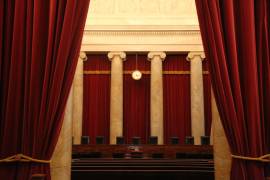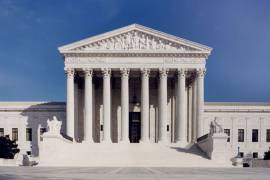
Gov. Rick Perry is Wrong on Marriage, Wrong on Courts
Blog Search
Immediately after U.S. District Court Judge Orlando Garcia struck down Texas’ discriminatory ban denying same-sex couples the freedom to marry, Texas Governor Rick Perry attacked the ruling in the statement released by his office:
Texans spoke loud and clear by overwhelmingly voting to define marriage as a union between a man and a woman in our Constitution, and it is not the role of the federal government to overturn the will of our citizens. The 10th Amendment guarantees Texas voters the freedom to make these decisions, and this is yet another attempt to achieve via the courts what couldn't be achieved at the ballot box. We will continue to fight for the rights of Texans to self-determine the laws of our state.
We have heard this rhetoric too many times before.
When faced with important civil rights cases, courts often come under fire from politicians, like Rick Perry, who attempt to characterize judges who uphold the Constitution as “activist” in an effort to attack the legitimacy of a particular decision.
We heard something similar from Utah Governor Gary Herbert, in the wake of Judge Robert Shelby’s ruling declaring Utah’s marriage ban unconstitutional: "I am very disappointed an activist federal judge is attempting to override the will of the people of Utah.
Let’s look at Rick Perry’s remarks and identify why they are wrong.
Perry: "Texans spoke loud and clear by overwhelmingly voting to define marriage as a union between a man and a woman in our Constitution, and it is not the role of the federal government to overturn the will of our citizens.
Wrong. Courts have a fundamental responsibility to uphold the Constitution. If the courts determine that a particular law unconstitutionally discriminates or deprives people of their rights, it is their duty to strike down that law. Voters and legislators don’t get to decide whether they will “allow” individuals to exercise their constitutionally protected rights. We don’t put the freedom of speech or the freedom of religion up for a public vote. State constitutions may build in additional protections above those guaranteed by the U.S. Constitution. However, the Constitution establishes a foundation for the protection of human liberty, and the states may not fall below that federal floor.
Perry: The 10th Amendment guarantees Texas voters the freedom to make these decisions, and this is yet another attempt to achieve via the courts what couldn't be achieved at the ballot box.
Wrong. The Constitution clearly provides that “No state shall … deny to any person … the equal protection of the laws.” The states regulate marriage, but they cannot do so in a way that conflicts with the Constitution. It is absolutely essential for courts to step in when voters run roughshod over minority rights. Throughout our nation’s history, the courts have preserved the rights of all citizens and the guarantee of equal protection of the laws. Cases like: Brown v. Board of Education, which set the precedent needed to abolish the legal framework of racial segregation; Loving v. Virginia, recognizing the fundamental right to marry the person of one’s choice; and Lawrence v. Texas, affirming the fundamental liberty right to private sexual intimacy, all overturned state laws that infringed on constitutional guaranties.
Now let’s correct Utah Governor Gary Herbert.
Herbert: "I am very disappointed an activist federal judge is attempting to override the will of the people of Utah.
Wrong. “Judicial activism” is a political term that is often used to attack a judge when the speaker simply disagrees with a decision, particularly with regard to civil rights. There will always be people that disagree with the outcome of a decision. When a law infringes on individual rights or equal treatment, judges have a duty to strike it down. This does not make them activist. They are upholding our Constitution. Justice Stephen Breyer sums this up nicely. "The fact is, once I'm appointed, I'm not a judge for one group or another group," he said. "And when I write a dissent or when I write a majority, the people that disagree with me the most -- I'm their justice too."
The framers of our Constitution wanted strong courts that protect individual rights and equal justice under the law. Governor Perry and Governor Herbert are free to disagree with the courts about marriage equality or any other issue—but they should not attack the essential role courts play in our constitutional democracy.




